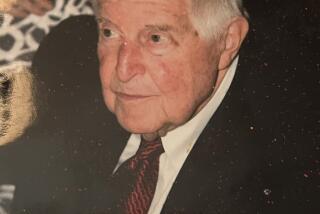John Tunney, California senator who worked for environmental protection and civil rights, dies at 83
Former U.S. Sen. John V. Tunney, who as a young lawyer and rising California political star toppled an entrenched Republican incumbent before facing his own defeat just six years later, has died. He was 83.
Tunney, who lived mainly in Sun Valley, Idaho, in recent years but also maintained homes in Los Angeles and New York, died of prostate cancer Friday at a home in Brentwood, his brother Jay Tunney said.
A son of former world heavyweight boxing champion Gene Tunney and his New York socialite wife, John Tunney grew up on the East Coast but moved his growing family to California as an Air Force lawyer in the 1960s. He soon began a career in public office that coincided with a tumultuous period of growth and an often-shifting political landscape in his adopted state.
As a congressman representing Riverside and Imperial counties, starting in 1965, and during his 1971-77 tenure in the Senate, the Democrat who had been raised in a privileged Republican family racked up a liberal voting record and worked passionately to advance environmental protection and civil rights causes.
He wrote antitrust legislation and shepherded two difficult and important bills onto the books — the Noise Pollution Control Act of 1972 and the 1975 extension and expansion of the landmark Voting Rights Act. He played a leading role in keeping the United States from getting involved in the civil war in Angola. With his cordial manner and strong negotiating skills, Tunney soon earned a reputation as someone who could work both sides of the political aisle to get laws passed.
Tunney was widely presumed to be the model for the Robert Redford character in the 1972 film “The Candidate.”
He wrote 38 bills that made it onto the books, unusual for a freshman senator, according to the Congressional Research Survey.
Former Rep. Jane Harman (D-Venice), who as a young lawyer served on Tunney’s Senate staff, said he was “always a big support system for me” and the two remained fast friends throughout his life.
Harman said she got an up-close look at Tunney’s strong work ethic and legislative skills when she was his district director, then chief counsel on two of the subcommittees he chaired.
“I always thought he was underrated as a senator,” Harman said. “I’d like to compare his record to [that of] any other first-term senator.”
But, as Tunney acknowledged after the 1976 election, his zeal for work in Washington helped lay the groundwork for his defeat for a second term.
“I’m not saying that I shouldn’t have been a hard-working, interested member of the Senate,” Tunney told The Times during an interview in his Los Angeles law office a few months after he lost to Republican S.I. Hayakawa, a former college president and political neophyte. “But I think that I would have been far better off not just in a political sense of getting reelected but better off as a person if I’d spent more time in California learning that one of the major things that was on people’s minds out here was that they didn’t want Washington to do things.”
He also took a mild swipe at reporters, saying some had been more interested in writing about his divorce, privileged upbringing and lifelong friendship with fellow Democratic Sen. Edward M. Kennedy of Massachusetts than in the work he was doing in the Senate. Tunney had trouble shaking a perception by some that he was a lightweight and a playboy, characterizations friends and colleagues said were far from true.
His family roots held fascination for those still in the thrall of the Camelot vibe of the Kennedys, who moved in some of the same circles as the Tunneys.
John Varick Tunney was born June 26, 1934, in New York to the retired boxing champion and Mary Josephine “Polly” Lauder Tunney, part of the Carnegie family of industrialists and philanthropists. Young Tunney grew up with his two brothers and sister on the family’s 200-acre Connecticut estate, Star Meadow Farm, near Stamford, and attended private schools.
Gene Tunney and Joseph P. Kennedy Sr., the businessman and former U.S. ambassador to Britain, were friends, and Ted Kennedy recalled spending time at the Tunney home as a boy before rooming years later with John Tunney when the two were law students at the University of Virginia.
Tunney earned a bachelor’s degree in anthropology from Yale in 1956 and received his law degree in 1959. Two years earlier, while studying international law at The Hague, Netherlands, he met his first wife, Mieke. The couple had three children before divorcing in 1973, after 14 years of marriage.
By then, Tunney had completed three terms in the House and was serving in the Senate. Tunney threw himself further into his work in the Capitol and wrote a book, “The Changing Dream,” about what he saw as looming shortages of food, fuel and natural resources in America.
To win his Senate seat in 1970, the 36-year-old Tunney had defeated Democratic Rep. George Brown in the primary and went on to best Republican Sen. George Murphy, a longtime friend of Ronald Reagan, then California governor. Ever the conciliator, Tunney initiated a meeting in Sacramento at which the governor and the new senator from opposite sides of the political spectrum promised to cooperate as much as possible “for the people of the state.”
But when it came time for his 1976 reelection campaign, Tunney found himself under attack in the Democratic primary by the more liberal Tom Hayden, a former antiwar activist who portrayed Tunney’s pragmatism and his relatively conservative fiscal positions as selling out.
Tunney defeated Hayden, but the effort weakened him going into the November general election against Hayakawa, who rose to prominence as the acting San Francisco State president who ripped the wires from a sound truck when he could not be heard over protesting students. That act, caught by television news cameras, made Hayakawa a hero to Californians outraged by student militants and anti-Vietnam War demonstrations and eventually led him into politics and the Senate race.
Following his narrow defeat, Tunney became a senior partner in one of California’s most politically connected law firms, known then as Manatt, Phelps, Rothenberg & Tunney. During the next few years, Tunney remarried and spent much of his time in Los Angeles. “There is nothing sadder than a 42-year-old former senator hanging around Washington,” Tunney told The Times a month after losing the election.
Tunney stayed at Manatt Phelps until early 1987. Although largely out of the public eye, he remained active in environmental causes, including serving on the board of Living with Wolves, an organization dedicated to raising consciousness of the animals’ importance. For many years he headed the board of the Hammer Museum at UCLA.
From his home in Idaho, he continued to manage his family’s investments and enjoyed poetry and reading, skiing, fly-fishing, hiking and bicycling. He and his wife, Kathinka, traveled abroad at least once a year and he used the internet to stay connected with current events.
“I try to keep up with what’s going on in the world around us,” Tunney said in a 2013 interview with The Times. “It’s hard to do that in Idaho.”
Looking back on his time in politics, Tunney said he had no regrets and counted his work on environmental and civil rights issues among his biggest contributions.
“I got great pleasure from it,” he said of his time in Congress. “I absolutely enjoyed the work and the challenges.”
“We did get a lot done, and I think that’s why so many people in Washington were quite stunned that I was defeated,” Tunney said.
In addition to his brother, Tunney is survived by his second wife, Kathinka Osborne Tunney, sons Mark and Ted, daughters Arianne and Tara, stepchildren Cedric Osborne and Dariane Osborne Hunt, and grandsons John, Liam and Andreas.
Merl is a former Times staff writer.
The Associated Press contributed to this report.
More to Read
Start your day right
Sign up for Essential California for the L.A. Times biggest news, features and recommendations in your inbox six days a week.
You may occasionally receive promotional content from the Los Angeles Times.







